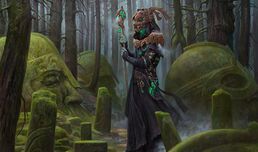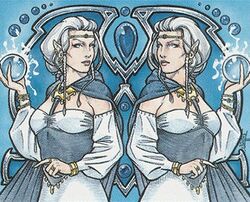Shapeshifter
| Shapeshifter | |
|---|---|
| Creature Type | |
| (Subtype for creature/kindred cards) | |
| Introduced |
Alpha (updated) Tempest (printed) |
| Last used | Aetherdrift |
| Scryfall Statistics | |
|
163 cards | |
|
12 token creation cards | |
|
3 typal cards | |
|
112 artworks | |
Shapeshifter is a creature type species describing a loosely-defined group of beings capable of assuming other shapes and forms, often imitating other beings. They can be found in all colors of mana, but predominately in blue. The first creature to bear the type was Unstable Shapeshifter in Tempest. Vesuvan Doppelganger and Clone from Alpha, and Shapeshifter from Antiquities were later issued errata to become Shapeshifters, as well.[1]
Storyline
Dominaria
Terisiare
Shyfts are mysterious beings that appeared on Terisiare during the Ice Age. Gerda Äagesdotter is supposed to have studied them.
Vesuva
The doppelgangers and shapeshifters of the isle of Vesuva are as mysterious as they are notorious. The magical doubles of visitors to the island have to tread cautiously as their doubles are murderously envious of the "originals."
Innistrad
Innistrad is home to various shapeshifters (like the Evil Twin and the Identity Thief) whose prime targets are humans. They assume their form to mix into human society, often with malicious purposes.
Ixalan
Protean Raiders can be found among the pirates of the Brazen Coalition, although it is unknown if any pirates are actively aware of their presence.
They were likely natives of Torrezon displaced by the ascent of the Legion of Dusk.
Kaldheim

The shapeshifters of Kaldheim live in the realm of Littjara. They wear intricately carved wooden masks to hide their true form.[2][3] They can take any form necessary to blend into their surroundings — including a shifting aurora form that enables them to move freely through the Cosmos — but they tend to prefer animal forms.
Green-aligned shapeshifters, known as Gladewalkers, prefer the forms of wild beasts over any humanoid identity. Bears are a favorite form, but any stag, lynx, bird, or squirrel spotted in the woodlands could be a Gladewalker in disguise. Covewalkers, the blue-aligned shapeshifters, are fascinated with water. They often take on the form of marine animals such as seals or dolphins. They also frequently adopt the identities of mariners, seafaring raiders, fishers, lighthouse keepers, and other humanoids who dwell on or near the waters.
Many believe that shapeshifters are formed from the same stuff as the Cosmos itself—pure shifting light and celestial energy. Whether or not that is their true nature, they can adopt a form similar to the auroras of the Cosmos to travel between realms. Curious and adaptable, they often spend only a few years of a brief childhood in Littjara before venturing out into the Cosmos to see and learn about other realms. Many shapeshifters spend almost their entire lives among other races until at last they return to Littjara for the last years of their lives and end their existence submerged and subsumed into Pentafjord Lake.
Kamigawa
On Kamigawa, Shape Stealers are spirits of the Kakuriyo who manifest in the physical world bearing the shape of whatever is nearby.
Lorwyn-Shadowmoor
Changelings
- For the keyword ability, see Changeling.

Lorwyn's shapeshifters are known as changelings (58 cards ). They are a race of relatively harmless, semi-intelligent humanoids who involuntarily change their shape into that of the creatures and plants around them.[4][5] A changeling's standard appearance is that of a squat, greenish-blue humanoid with slightly scaly skin, large eyes, a translucent body, and frequently a forked tail.[6][7] They typically stand 2 to 7 feet tall.[8]
Changelings have no culture per se. They don't have technology or art. When they speak, it's incoherent parroting. They are creatures of high magic, but they don't have the intellectual wherewithal to forge an agenda as a race. There are no notable changeling individuals; they are indistinguishable from each other by anyone other than themselves.
Changelings are skilled at mimicry, but they're far from devious or deceptive; changelings are obvious. No matter what shape a changeling takes, it always has its characteristic opalescent sheen and its translucent look to it.[4] Thought to be harbingers of good luck, most of Lorwyn's inhabitants tolerate their presence.[5] They can't use their transformation abilities to their advantage, because they automatically adapt to whatever forms are near them. Changelings do not substitute themselves for the children of other races, but a faerie or boggart might pull such a prank on an unsuspecting kithkin mother at times.
Changelings can be found all over Lorwyn, in every kind of terrain. They have no proper homeland, but they are associated with a mysterious cavern called Velis Vel, where they convene each year, and new changelings are created.[9] Changelings are now said to be harbingers of good luck, having proven worthy allies in the conflict against the Phyrexians.[5]
Mimics
Changelings on Shadowmoor are known as mimics, aggressive and vicious creatures that attack in packs while taking forms that resemble warped reflections of their victims. Since Oona's downfall, changelings remain in Lorwyn unless they are driven into Shadowmoor unwillingly.[5]
Pucas
Active only in Shadowmoor, pucas are horse-headed shapeshifters whose moods swing wildly from mischief to malice.[10][11] They use their shapeshifting abilities to hide in plain sight, then strike when their quarry's guard is down.[12] It's said that a puca hates its reflection, so some Elves carry mirrored daggers when in puca territory.[13] They are amphibious and are particularly common near flooded swamps, mountain streams, and waterfalls.
Mirrodin
Mechanical duplicants are common across the face of Mirrodin, taking the form of the living or dead.
Rath
Volrath's many experiments on Rath bore many results that took after their master.
Ravnica
Lupuls
Lupul is a name derived from the Old Ravi word for "lurker". Found solely in Ravnica, Lupuls are shapeshifters that follow the vampire Szadek.[14] In their natural forms, they have the form of a mass of blue-white worms that can move as a single creature with surprising speed and dexterity [15]. In this form, they are similar to insects and as such those akin to the bugs can communicate with them and to some extent control them, one such example is Jarad the devkarin hunter. They shapeshift by consuming others, and once they have consumed a living thing in its natural form, they can later change into that creature's form whenever they choose. Lupuls are extremely stealthy and nearly impossible to catch.
Thought to have been defeated centuries before the Decamillennial, they resurfaced under Szadek's command, until his control was disrupted by Jarad.
Humanoids
Though much harder to tell their natural shape, Dimir agents such as the Dimir Doppelganger or Lazav use their constantly shifting physiology to infiltrate places and organizations.
Universes Beyond

|
External franchise There are more wonders in this universe than you could ever have dreamt of.
|
The Zygons (5 cards ) from Doctor Who are an alien race of humanoid shapeshifters. In their natural state, they are solidly built humanoids with large, cone-shaped heads. Their heads, arms, and torsos are covered in suckers, and they have deeply inset faces. They have the natural ability to shapeshift into other humanoid races.
Notable Shapeshifters
Kindred type
Lorwyn block featured six kindred Shapeshifter cards with changeling, which could be fetched by all Harbingers (8 cards ) or made cheaper by all Bannerets (5 cards ):
- Blades of Velis Vel
- Crib Swap
- Ego Erasure
- Nameless Inversion
- Shields of Velis Vel
- Wings of Velis Vel
Lorwyn Eclipsed added one more kindred Shapshifter card:
Tokens
| Token name | Color | Type line | P/T | Text box | Source | Printings |
|---|---|---|---|---|---|---|
| Shapeshifter | Creature — Shapeshifter | 1/1 | Changeling | |||
| Creature — Shapeshifter | 2/2 | Changeling | ||||
| Creature — Shapeshifter | 3/2 | Changeling | ||||
| Creature — Shapeshifter | X/X | Changeling (This token is every creature type.) Deathtouch |
||||
| Creature — Shapeshifter | 2/2 | Changeling | ||||
| Vizier of Many Faces | Creature — Zombie Shapeshifter Cleric | 0/0 | You may have Vizier of Many Faces enter the battlefield as any creature on the battlefield, except it has no mana cost, it's white and it's a Zombie in addition to its other types. | |||
| Osgood, Operation Double | Creature — Human Alien Shapeshifter | 2/2 | Paradox — Whenever you cast a spell from anywhere other than your hand, investigate. (This token’s mana cost is |
| Token name | Color | Type line | P/T | Text box | Source | Printings |
|---|---|---|---|---|---|---|
| Shapeshifter | Creature — Shapeshifter | 3/2 | Changeling |
Trivia
- In the Grand Creature Type Update the creature types Clone, Doppelganger and Shyft were changed into Shapeshifter.[1]
- The creature type of the Lurker was changed from "Lurker" to Beast, not to Shapeshifter (cf. Lupul, above).
- Most, if not all, clones and changelings are printed with the type Shapeshifter, despite that in practice this will be superseded by their other abilities.
- Shadowmoor's pucas are based on the shape-changing púcaí of Celtic folklore.[10]
References
- ↑ a b Mark Rosewater (November 21, 2022). "The Shapeshifting Sands". Magicthegathering.com.
- ↑ Ari Zirulnik (January 8, 2021). "Planeswalker's Guide to Kaldheim, Part 1". magicthegathering.com. Wizards of the Coast.
- ↑ Ari Zirulnik and Jenna Helland (January 14, 2021). "Planeswalker's Guide to Kaldheim, Part 2". magicthegathering.com. Wizards of the Coast.
- ↑ a b (2007). Lorwyn Player's Guide. Wizards of the Coast.
- ↑ a b c d Neale LaPlante Johnson, DK Billins, Laurel Pratt (September 26, 2025). "Planeswalker's Guide to Lorwyn Eclipsed". magicthegathering.com. Wizards of the Coast.
- ↑ Magic Arcana (November 20, 2007). "Flexible Changelings". magicthegathering.com. Wizards of the Coast. Archived from the original on 2021-04-29.
- ↑ Magic Arcana (February 28, 2008). "Lorwyn Style Guide: How to draw Changelings". magicthegathering.com. Wizards of the Coast. Archived from the original on 2020-11-12.
- ↑ Amanda Hamon Kunz et al. (2025). "D&D Lorwyn: First Light". Wizards of the Coast.
- ↑ Doug Beyer (November 21, 2007). "This Article is Every Creature Type at All Times". magicthegathering.com. Wizards of the Coast. Archived from the original on 2021-04-29.
- ↑ a b Doug Beyer (July 09, 2008). "Selkies and Subtypes". magicthegathering.com. Wizards of the Coast. Archived from the original on 2021-01-16.
- ↑ Doug Beyer (July 30, 2008). "Concepting Eventide, Part 2". magicthegathering.com. Wizards of the Coast. Archived from the original on 2020-11-12.
- ↑ (2008). Eventide Player's Guide. Wizards of the Coast.
- ↑ Doug Beyer (July 30, 2008). "Concepting Eventide, Part 2". magicthegathering.com. Wizards of the Coast. Archived from the original on 2020-11-12.
- ↑ Cory J. Herndon (2005). Ravnica Cycle, Book I: Ravnica, Wizards of the Coast
- ↑ Mindleech Mass
